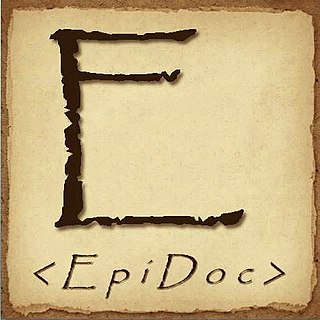
C. Michael Sperberg-McQueen is an American markup language specialist. He was co-editor of the Extensible Markup Language (XML) 1.0 spec (1998), and chair of the XML Schema working group.

C. Michael Sperberg-McQueen is an American markup language specialist. He was co-editor of the Extensible Markup Language (XML) 1.0 spec (1998), and chair of the XML Schema working group.
He was also instrumental in the Text Encoding Initiative (TEI), an international cooperative project to develop and disseminate guidelines for the encoding and interchange of electronic text for research. He was co-editor, with Lou Burnard, of the TEI's Guidelines for Electronic Text Encoding and Interchange in 1994. He also served as editor in chief of the TEI from 1988 to 2000. [1]
XML and TEI have become ubiquitous in their domains. Sue Polanka (Head of Reference/Instruction, Wright State University Libraries) notes that the TEI "...in the 1980s and 90s established a fundamental set of methods and practices that now underpin most digital humanities scholarship" [2] Sperberg-McQueen has been a key leader of these and other standards efforts through extensive speaking, teaching, writing, and research.
He holds a Ph.D. in comparative literature from Stanford University, and has taught and published widely on markup systems, [3] overlapping markup, [4] formal languages, [5] semantic theory, [6] and other topics.
In 2015, Sperberg-McQueen held courses on Digital Humanities at the Technische Universität Darmstadt as visiting professor. [7] He also talked in an interview about his work experience for the Princeton University and the Symbiose of computers and humanities. [8]

A markuplanguage is a text-encoding system which specifies the structure and formatting of a document and potentially the relationship between its parts. Markup can control the display of a document or enrich its content to facilitate automated processing.

Extensible Markup Language (XML) is a markup language and file format for storing, transmitting, and reconstructing arbitrary data. It defines a set of rules for encoding documents in a format that is both human-readable and machine-readable. The World Wide Web Consortium's XML 1.0 Specification of 1998 and several other related specifications—all of them free open standards—define XML.

The Geography Markup Language (GML) is the XML grammar defined by the Open Geospatial Consortium (OGC) to express geographical features. GML serves as a modeling language for geographic systems as well as an open interchange format for geographic transactions on the Internet. Key to GML's utility is its ability to integrate all forms of geographic information, including not only conventional "vector" or discrete objects, but coverages and sensor data.
In computing, RELAX NG is a schema language for XML—a RELAX NG schema specifies a pattern for the structure and content of an XML document. A RELAX NG schema is itself an XML document but RELAX NG also offers a popular compact, non-XML syntax. Compared to other XML schema languages RELAX NG is considered relatively simple.

The Text Encoding Initiative (TEI) is a text-centric community of practice in the academic field of digital humanities, operating continuously since the 1980s. The community currently runs a mailing list, meetings and conference series, and maintains the TEI technical standard, a journal, a wiki, a GitHub repository and a toolchain.
Open Scripture Information Standard (OSIS) is an XML application, that defines tags for marking up Bibles, theological commentaries, and other related literature.

EpiDoc is an international community that produces guidelines and tools for encoding in TEI XML scholarly and educational editions of ancient documents, especially inscriptions and papyri.
Data exchange is the process of taking data structured under a source schema and transforming it into a target schema, so that the target data is an accurate representation of the source data. Data exchange allows data to be shared between different computer programs.
A structured document is an electronic document where some method of markup is used to identify the whole and parts of the document as having various meanings beyond their formatting. For example, a structured document might identify a certain portion as a "chapter title" rather than as "Helvetica bold 24" or "indented Courier". Such portions in general are commonly called "components" or "elements" of a document.
MECS is the Multi-Element Code System, a markup system developed by the Wittgenstein Archives at the University of Bergen. It is very similar to SGML and XML except that it allows elements to overlap.
The Music Encoding Initiative (MEI) is an open-source effort to create a system for representation of musical documents in a machine-readable structure. MEI closely mirrors work done by text scholars in the Text Encoding Initiative (TEI) and while the two encoding initiatives are not formally related, they share many common characteristics and development practices. The term "MEI", like "TEI", describes the governing organization and the markup language. The MEI community solicits input and development directions from specialists in various music research communities, including technologists, librarians, historians, and theorists in a common effort to discuss and define best practices for representing a broad range of musical documents and structures. The results of these discussions are then formalized into the MEI schema, a core set of rules for recording physical and intellectual characteristics of music notation documents. This schema is expressed in an XML schema Language, with RelaxNG being the preferred format. The MEI schema is developed using the One-Document-Does-it-all (ODD) format, a literate programming XML format developed by the Text Encoding Initiative.
This is a comparison of data serialization formats, various ways to convert complex objects to sequences of bits. It does not include markup languages used exclusively as document file formats.
The Office Open XML file formats are a set of file formats that can be used to represent electronic office documents. There are formats for word processing documents, spreadsheets and presentations as well as specific formats for material such as mathematical formulas, graphics, bibliographies etc.
Steven J DeRose is a computer scientist noted for his contributions to Computational Linguistics and to key standards related to document processing, mostly around ISO's Standard Generalized Markup Language (SGML) and W3C's Extensible Markup Language (XML).

Akoma Ntoso (Architecture for Knowledge-Oriented Management of African Normative Texts using Open Standards and Ontologies) is an international technical standard for representing executive, legislative and judiciary documents in a structured manner using a domain specific, legal XML vocabulary.
In markup languages and the digital humanities, overlap occurs when a document has two or more structures that interact in a non-hierarchical manner. A document with overlapping markup cannot be represented as a tree. This is also known as concurrent markup. Overlap happens, for instance, in poetry, where there may be a metrical structure of feet and lines; a linguistic structure of sentences and quotations; and a physical structure of volumes and pages and editorial annotations.
Lou Burnard is an internationally recognised expert in digital humanities, particularly in the area of text encoding and digital libraries. He was assistant director of Oxford University Computing Services (OUCS) from 2001 to September 2010, when he officially retired from OUCS. Before that, he was manager of the Humanities Computing Unit at OUCS for five years. He has worked in ICT support for research in the humanities since the 1990s. He was one of the founding editors of the Text Encoding Initiative (TEI) and continues to play an active part in its maintenance and development, as a consultant to the TEI Technical Council and as an elected TEI board member. He has played a key role in the establishment of many other activities and initiatives in this area, such as the UK Arts and Humanities Data Service and the British National Corpus, and has published and lectured widely. Since 2008 he has worked as a Member of the Conseil Scientifique for the CNRS-funded "Adonis" TGE.